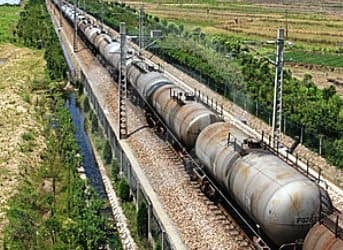The ongoing stalemate between Ottawa and Washington over the future of the controversial $5.3 billion Keystone XL pipeline has proven a boon to Canada’s railways, which are seeing a surge in shipments moved by rail.
Keystone XL project, which has become a divisive environmental issue in at both the state and federal level in the U.S., is designed to move both Alberta Canadian oil sands crude and light oil from North Dakota’s booming Bakken region. Whether or not the pipeline is eventually built, Canadian rail operators have moved into the vacuum and are reaping the benefits.
The latest project to upgrade Canadian rail facilities has been proposed by Calgary-based Torq Transloading Inc. which on 14 August stated in a press release its intention to build a $100 million crude-by-rail terminal near Kerrobert in western Saskatchewan that could load two 120-car trains with heavy crude oil each day as well as store 500,000 barrels in tanks. According to its website, “Torq Transloading is a progressive company, focused on transloading oilfield fluids and materials from truck to rail, and rail to truck through the construction and operation of transloading facilities throughout Western Canada.”
The new facility will more than quadruple Torq Transloading Inc.’s shipping output to 168,000 barrels a day when its planned Kerrobert rail terminal hits full production in autumn 2014.
Related article: Trucks, Trains, or Pipelines – The Best Way to Transport Petroleum
Torq Transloading Inc. CEO Jarrett Zielinski said, about the development, “In the location selection process for the Kerrobert Rail Terminal, we took the scale-at-hub approach. We feel that Kerrobert is strategic in that it allows maximum diversity and flexibility for crude-by-rail out of Western Canada. It is as far south and east geographically in Canada that allows us to not only access vast amounts of pipeline delivered crude oil but also it allows us to access significant quantities of heavy, undiluted crudes in the Lloydminster-Kerrobert corridor. Kerrobert, Saskatchewan, is geographically as close to the heavy crude’s natural destination markets as possible by rail, minimizing transportation costs relative to similar crude types to be shipped by rail originating further north and west in Alberta. Our estimation is that the Kerrobert Rail Terminal could offer transportation savings to the US Gulf Coast and East Coast upwards of $5.00 per barrel compared with shipping similar crudes by rail out of certain locations in Alberta.”
Torq Transloading Inc. is a privately held midstream oilfield service provider that currently operates six crude-by-rail transload terminals across Alberta and Saskatchewan. Torq Transloading Inc. operates on behalf of Canadian Pacific Railway at Tilley, Alberta and Lloydminster, Saskatchewan and for Canadian National Railway, at Whitecourt, Alberta. Torq Transloading Inc. has operations in the Shaunavon, Unity and Bromhead, Saskatchewan regions and its affiliate, Goulet Trucking provides delivery of trucked-in volumes across the network of six crude-by-rail terminals.
Related article: No More Spills? New Technology Could Transform the Pipeline Sector
While currently about 150,000 barrels roll on Canadian rails each day, according to ARC Financial Corp., rail facilities with a total capacity of 708,000 bpd, about a quarter of Canada’s current overall oil output, are to be built by 2015. Among these are Gibson Energy Inc. and U.S. Development Group LLC of a 140,000-barrel-a-day rail terminal in Hardisty, Alberta and Keyera Corp. and Kinder Morgan Energy Partners LP planned 40,000 bpd in Edmonton, Alberta.
The only slight dark cloud on this otherwise boom picture for Canadian railways is the 6 July derailment and explosion of an unmanned oil train in Lac-Mégantic, Quebec, which killed 47 people and destroyed a large part of the town.
Zielinski said that the Lac-Mégantic tragedy led his company to “pause and review risk” before continuing, “We have certainly been pioneers in the safety component of (rail transport of oil) and work with regulatory bodies to overcome some of the current safety issues.”
Bottom line?
“However, the product needs to get to market and we feel we can help facilitate that in a safe way.”
Oh, remember the Lloydminster, Saskatchewan crude-by-rail transload terminal operated by Torq Transloading Inc. on behalf of Canadian Pacific Railway? On 27 July a locomotive and seven tank cars carrying oil derailed around 5 p.m. while the train was moving cars out of the railyard. No one was injured and the area didn’t have to be evacuated. Canadian Pacific Rail spokesman Ed Greenberg said, "A full investigation is being conducted to determine what took place — not just the cause, but the circumstances that led to the cause."
By. John C.K. Daly of Oilprice.com


















